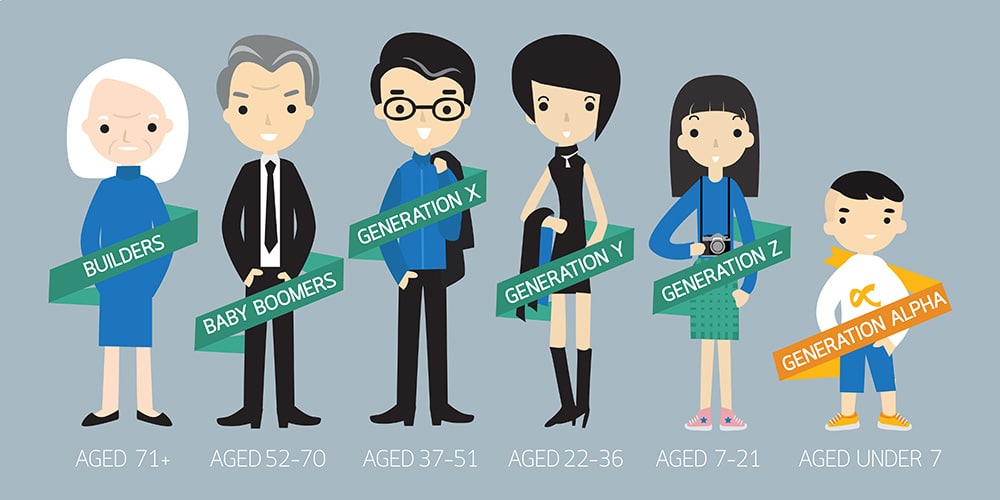In today’s fast-paced world, professionals are increasingly experiencing the (FOMO) Fear of Missing Out even as they enter their 60s and beyond. The FOMO effect can cause anxiety and feelings of inadequacy among older adults who feel pressured to keep up with younger generations in various aspects of life, such as career advancement, technology, and social connectedness.
One of the critical causes of the FOMO effect in professionals over 60 is the rapid evolution of technology and work practices, often leaving them feeling disconnected from the ever-changing professional landscape. Furthermore, the rise of social media plays a significant role in highlighting the accomplishments and achievements of others, exacerbating the fear of being left behind.
To thrive in a world dominated by the concerns of FOMO, aging professionals should focus on strategies that will help them stay relevant and connected to younger generations. This may include embracing new technologies, fostering intergenerational relationships, and engaging in self-reflection to understand and accept their unique positions and experiences in the professional world. By doing so, they can effectively navigate the challenges of the FOMO effect and create a meaningful and fulfilling professional life beyond the 60s.
Understanding Professional Life Beyond 60s
In today’s fast-paced work environment, professionals beyond their 60s may experience the FOMO effect, which stands for Fear of Missing Out. This phenomenon can harm their mental well-being and their ability to connect with younger generations. However, it is essential to understand that age can help performance and productivity.
Life satisfaction, which is often correlated with one’s age, can maintain a high level even in later years, especially if individuals continue to pursue meaningful work. Embracing the values and uniqueness of each generational group could be a driving force for fostering better relationships and encouraging productivity in the workplace.
Professionals beyond their 60s may need help with adjusting to rapid technological advancements. However, by staying informed and continuously learning, they can utilize their vast experience and wisdom to contribute effectively to the work environment. They can also seek to bridge the gap with younger generations by showing empathy and openness, allowing both parties to learn and grow together.
One key aspect for ensuring a smooth transition into professional life beyond the 60s is embracing adaptability. This includes being open to change and actively engaging in activities that promote personal and professional growth. Maintaining a healthy work-life balance and focusing on mental well-being is another crucial factor in sustaining high levels of life satisfaction.
Age should not be considered a limiting factor in terms of performance, productivity, or life satisfaction. Professionals beyond their 60s can continue contributing significantly to their workplace by being adaptable, open to learning, and connecting with colleagues across different generations. Emphasis on mental well-being and embracing diverse values can aid in fostering a fulfilling and successful professional life beyond the 60s.
Exploring the FOMO Effect
The Fear of Missing Out (FOMO) is a psychological phenomenon that manifests as anxiety when individuals perceive they may be missing out on valuable experiences, information, or opportunities around them. Various factors, including social media use, personal expectations, and comparisons to the lives of others, can trigger FOMO. When left unchecked, FOMO can negatively impact mental health and overall well-being.
As individuals enter their 60s and beyond, they may face unique challenges when it comes to experiencing FOMO. In this stage of life, people may feel a heightened sense of urgency to remain connected and engaged with younger generations. This desire to stay connected can exacerbate FOMO symptoms, particularly in the context of social media use and perceptions of personal accomplishments compared to others.
FOMO can cause a range of negative emotional states, including anxiety, depression, envy, and emotional distress. These emotions may stem from unmet social relatedness needs, loneliness, or boredom proneness. Additionally, FOMO has been linked to lower self-esteem and increased social anxiety. To maintain mental and emotional health, it is crucial for individuals experiencing FOMO to recognize and address these issues head-on.
There are several strategies to combat the FOMO effect in professional life beyond the 60s. First, individuals should consider reducing social media usage or adjusting their sources of information to limit exposure to triggering content. Engaging in self-reflection can also be beneficial, helping individuals pinpoint their priorities, set realistic expectations, and focus on their personal accomplishments rather than comparing themselves to others.
Connecting with younger generations can be a fulfilling way to address FOMO concerns. By fostering intergenerational relationships, older professionals can share their wisdom, learn from new perspectives, and build meaningful connections. These relationships can offer fresh insights and alleviate feelings of missing out, ultimately creating a more positive and enriching professional experience.
Acknowledging and addressing FOMO can lead to increased emotional well-being and overall satisfaction in one’s professional life beyond the 60s. By developing self-awareness, reducing exposure to triggers, prioritizing personal goals, and cultivating intergenerational relationships, individuals can take proactive steps to mitigate the FOMO effect and create a more enriching and fulfilling experience in both their personal and professional lives.
The Role of Social Media
Social media plays a significant role in the lives of people from different age groups, including those in their 60s and beyond. One of the prominent issues many people face, particularly in the age of technology, is the Fear of Missing Out (FoMO). FoMO refers to a constant concern that others are enjoying rewarding experiences while one is not present or involved. This feeling is often intensified with the use of social media apps, where users can see updates and posts from their acquaintances.

Problematic social media use has become increasingly common, affecting adolescents and young people and extending to older generations. The prevalence of problematic internet and smartphone use has led to a growing need for individuals from all age groups to cope with feelings of being disconnected and the urge to stay connected online.
In light of these challenges, finding ways to connect with younger generations while overcoming the FoMO effect is essential. One approach is to seek meaningful, in-person interactions that do not solely rely on social media platforms. Communicating and engaging with younger family members, colleagues, and friends through shared interests, hobbies, or community activities can foster strong and lasting connections.
Another essential aspect in tackling the FoMO effect is reflecting on social media’s role in one’s life. Maintaining a healthy balance between online and offline activities is crucial. Regularly evaluating the time and energy spent on social media apps, setting aside dedicated periods for disconnecting, and participating in traditional social activities can help alleviate FoMO’s negative impact.
Furthermore, understanding and empathizing with the challenges younger generations face, such as the pressures of academics and employment, can bridge generational differences and foster open communication. Connecting with adolescents, teens, and young adults becomes easier by displaying genuine interest and offering guidance based on one’s experiences.
Managing the FoMO effect in professional life beyond the 60s involves deeply understanding social media’s role, adopting strategies to cope with its challenges, and proactively engaging with younger generations. Focusing on meaningful connections and active participation in shared experiences makes leading a fulfilling social and professional life possible while staying connected across generations.
The Causes of Fear of Missing Out
The Fear of Missing Out (FOMO) is a phenomenon that resonates with individuals of all ages but becomes particularly prevalent as people advance into their 60s. It is essential to understand various triggers that cause FOMO and ways to handle it, especially when interacting with younger generations.
One primary cause of FOMO in older individuals is anxiety. As they age, people may feel increasingly left out of conversations and activities among their younger counterparts. This fear can lead to heightened anxiety, making them more sensitive to potential triggers and enhancing their desire to participate in the latest trends and events.
Loneliness is another significant factor contributing to FOMO. Older people who experience a lack of social connections may develop a strong urge to participate in activities that younger generations are engaging in. This desire to connect with others can exacerbate the feeling of missing out, leading to a cycle of isolation and FOMO.
Triggers for FOMO can vary from individual to individual. These may include constantly being exposed to younger people’s social media updates, witnessing friends and acquaintances participating in events, or even observing changes in fashion or technology. All of these elements can contribute to a heightened sense of missing out.
In romantic relationships, FOMO can intensify when one feels disconnected from their partner due to a lack of shared interests or activities. Such a feeling can further impact their self-esteem, leading them to question their worth and attractiveness.
Several strategies can be employed to manage FOMO while connecting with younger generations. Some ways to cope include engaging in conversations with younger people to learn about their interests, staying updated with current events, and prioritizing one’s mental well-being by participating in activities that provide personal fulfillment.
The causes of FOMO are multifaceted and can impact people beyond the age of 60. Acknowledging these factors, such as anxiety, triggers, loneliness, and self-esteem in romantic relationships, is crucial for older individuals to connect with younger generations effectively.
How to Deal with FOMO
Fear of missing out, or FOMO, can negatively affect mental well-being and social connectedness, especially in professional life beyond the 60s. Dealing with FOMO can help maintain a strong connection with younger generations and effectively cope with the challenges of modern working life.
One of the effective ways to combat FOMO is by undergoing therapy, specifically cognitive behavioral therapy (CBT). This therapeutic approach focuses on identifying and modifying negative thought patterns, helping individuals understand their emotional reactions to the fear of missing out. CBT can be instrumental in developing healthier thought processes and coping mechanisms.
Incorporating mindfulness into daily life is another helpful technique for managing FOMO. Mindfulness practices, such as meditation and deep-breathing exercises, encourage living in the present moment, reducing feelings of anxiety and stress. These practices can enhance emotional regulation and improve focus to navigate professional and social life more effectively.
A digital detox, or taking a break from social media and other technology, can also be beneficial in reducing FOMO. During this break, engaging in meaningful face-to-face interactions and activities that nourish well-being is essential. By disconnecting from the digital world, individuals can refocus on tangible experiences and foster healthier relationships with others.
Journaling is another practical tool for dealing with FOMO. Writing down thoughts and experiences can provide a space for self-reflection and self-awareness. This process enables individuals to understand their triggers and effectively discover strategies to manage their emotions associated with FOMO.
Breathing exercises, such as deep and controlled breaths, can help deal with feelings of anxiety prompted by FOMO. These exercises can provide immediate relief by activating the body’s relaxation response when fear of missing out arises.
Maintaining a regular sleep schedule is crucial in combating FOMO. Adequate sleep makes individuals more focused, attentive, and emotionally stable during the day. By prioritizing sleep, working professionals can better manage their time, making them less susceptible to the fear of missing out.
Addressing FOMO through these strategies can create a healthier balance between work, personal life, and social connections. By incorporating techniques such as therapy, mindfulness, digital detox, journaling, breathing exercises, and maintaining good sleep habits, individuals can mitigate the adverse effects of FOMO and foster fruitful interactions across generations.
Engaging with Younger Generations
To effectively engage with younger generations, it is crucial to understand the unique challenges they face in today’s society. One of the most common concerns among adolescents is the Fear of Missing Out (FOMO) effect, which involves experiencing anxiety and envy when reading about others’ experiences and accomplishments on social media. This phenomenon can lead to a constant urge to stay connected and a fear of missing out on important events and opportunities.

Older individuals need to know their experiences and the contemporary context they are growing up to connect with young people. Open communication and establishing common ground can enhance interpersonal relationships between different generations. By practicing active listening and empathy, seniors can better understand the needs and concerns of today’s youth, including their experiences with peer pressure and social demands.
Conversely, young people can benefit from engaging with older generations, who can offer valuable insight and wisdom based on their life experiences. Sharing stories and exchanging ideas can create a connection and foster mutual respect and understanding. This exchange can also help instill valuable lessons about resilience and coping with society’s challenges.
Regarding practical steps, seniors may consider participating in intergenerational programs, such as mentorship opportunities and community initiatives, facilitating interactions and collaboration with younger generations. By participating in these programs, older individuals can learn about the interests, values, and goals of today’s teens and adolescents while offering their expertise and perspectives.
Technology can also be leveraged to bridge the generational gap. Older individuals may learn about and engage with the digital tools and platforms commonly used by young people. By familiarizing themselves with social media, seniors can better understand the world in which today’s youth operate and the impact of FOMO on their mental well-being and social connectedness.
Engaging with younger generations involves making an effort to understand their experiences, finding common ground, and participating in activities that promote open communication and connection. By doing so, individuals of all ages can benefit from exchanging knowledge, wisdom, and perspectives, leading to a more inclusive, understanding, and supportive society.
Reflections on Life Beyond 60 in the Digital Age
In today’s fast-paced digital world, those in their 60s and beyond may experience a transitional period as they adapt to new technologies and navigate the challenges of the digital age. As people age, various factors such as life satisfaction, values, goals, mental health, physical well-being, and connections to others become increasingly important.
One significant aspect of the digital age for older individuals is the FOMO effect or the fear of missing out. This can be caused by social media, where people tend to share their best moments and generate an illusion of perfection, leading others to feel left behind or unable to keep up with younger generations. To overcome FOMO, individuals can be encouraged to adopt a more mindful approach to social media usage and prioritize real-life connections with friends and family.
Connecting with younger generations presents both challenges and opportunities. Developing intergenerational relationships can promote a sense of belonging and boost one’s mental and emotional well-being. To bridge the generational gap, older individuals can:
- Stay open-minded and adapt to new technologies
- Engage in meaningful conversations, sharing both wisdom and learning from the younger generation
- Participate in joint activities to create shared experiences
Values and goals may shift as people move beyond their 60s, transitioning from careers to retirement and focusing more on personal growth and life satisfaction. It is essential to reassess priorities and align one’s life around these new objectives, which may involve developing or expanding hobbies, volunteering, or finding new ways to engage in the community.
As physical well-being declines with age, adopting healthy habits and maintaining an active lifestyle becomes crucial. Regular exercise, a balanced diet, and sufficient sleep can improve overall health and prevent age-related health issues.
Lastly, mental health significantly affects the quality of life beyond 60. Reflecting on personal achievements, engaging in meaningful social connections, and practicing gratitude can enhance life satisfaction and foster positive mental health.
In conclusion, adapting to the digital age and addressing its challenges can help individuals beyond 60 lead a fulfilling and connected life, embracing new opportunities and maintaining overall well-being.



